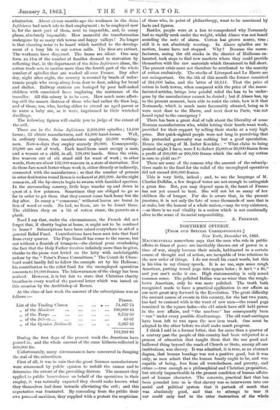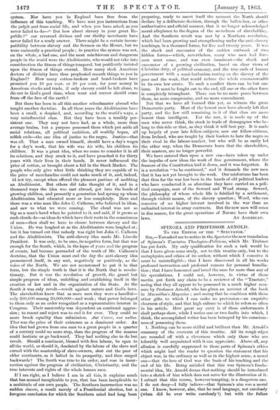NORTHERN OPINION.
[FROM OUR SPECIAL CORRESPONDENT.] New York, December 16, 1862. MACCHIAVELLI somewhere says that the men who rule in public affairs in times of peace are inevitably thrown out of power in a time of war, simply because their minds, habituated to a certain course of thought and of action, are incapable of true relations to the new order of things. I do not recall his exact words, but this is his idea in my clumsy speech. It is no use, says some rough American, putting round pegs into square holes ; it isn't "a fit," and you can't make it one. High statesmanship is only sound common sense. The polished Italian was no wiser than the rough- hewn American, only he was more polished. The truth both recognized needs to have a practical application in our affairs as our next great step forward in the Revolution. The great difficulty the onward course of events in this country, for the last two years, has had to contend with is the want of new men—the round pegs remained in the square holes—the old minds have still held power in the new affairs, and "the machine" has consequently been "run" under every possible disadvantage. The old road-carriages have been left to run upon the new iron track. One must be adapted to the other before we shall make much progress.
I think I said in a former letter, that for more than a quarter of a century past the people of this country had been subjected to a process of education that taught them that the one good and hallowed thing beyond the reach of Church or State, among all our institutions, was slavery. It was admitted, it is true, as an abstract dogma, that human bondage was not a positive good, but it was only, as men admit that the human family ought to be, and was capable of being, free from all wretchedness, and poverty, and crime ;—true enough as a philosophical and Christian proposition, but utterly impracticable in the present condition of human affairs and of human character. The concrete, practical fact that has been pounded into us is that slavery was so interwoven into our social and political system that it partook of much that was absolutely good, and that to attempt to tear it out could only lead to the utter destruction of the whole system. Nor have you in England been free from the influence of this teaching. We have sent you instructions from the pulpit and from social life, and when you have asked, as you never failed to do—" But how about slavery in your great Re- public ?" our reverend divines and our thrifty merchants have never failed for a ready answer. There might be a certain incom- patibility between slavery and the Sermon on the Mount, but we were eminently a practical people ; in practice the system was not, on the whole, a bad one, and the most mischievous and dangerous people in the world were the Abolitionists, who would not take into consideration the fitness of things temporal, but pestilently insisted upon the fitness of things eternal. How many sleek American doctors of divinity have thus prophesied smooth things to you in England? How many cotton-brokers and bond-brokers have promised you 10 per cent. or 20 per cent, for your money in American stocks and trade, if only slavery could be left alone, to die out in God's good time, when want and sorrow should cease from off the face of the earth?
But there has been in all this another schoolmaster abroad who taught another doctrine. In all these years the Abolitionists have been a small, a despised, and, according to the world's ways, a very uninfluential class. But they have been a terribly per- sistent one. They may not have had, as a whole, more than average brains, but a purpose possessed them which put aside all social relations, all political ambition, all worldly hopes, all selfish ends—the one idea of justice to the negro. Justice—that was all. That a man owned himself, should have a day's wages for a day's work, that his wife was his wife, his children his children. It was a great idea, when we come to consider it in all its relations, and they stuck to it, and have preached it for thirty years with their lives in their hands. It never influenced the price of cotton, or brought about a fall in the Stock Market. The people who only give what little thinking they are capable of to the price of merchandise could not make much of it, and, indeed, Id not try, except when offered the pleasant pastime of mobbing an Abolitionist. But others did take thought of it, and in a thousand ways the idea was cast abroad, got into the heads of growing children, and presently a generation had sprung up whom Abolitionism had educated more or less completely. Here and there was a wise man like John C. Calhoun, who believed in ideas, and saw to what we were coming. The cloud was not so big as a man's hand when he pointed to it, and said, if it grows as such clouds do—as ideas do which have their roots in the consciences of men—then shall we have to choose between slavery and the Union. He was laughed at as the Abolitionists were laughed at ; but it has turned out that nobody was right but John C. Calhoun and the Abolitionists. The anti-slavery idea made Mr. Lincoln President. It was only, to be sure, its negative form, but that was enough for the South, which, in the lapse of years and the progress of events, had become persuaded of the truth of Mr. Calhoun's doctrine, that the Union must end the clay the anti-slavery idea pronounced itself, in any sort, negatively or positively, as the voice of the North. We are not accustomed to put it in that form, but the simple truth is that it is the North that is revolu- tionary. But it was the revolution of growth, the grand but simple progress of ideas, unfolding and tstablishiirg itself in the creation of law and in the organization of the State. At the South it was only revolt—revolt against nature and God's laws. The slaveholders knew that as mere men they were a handful— only 300,000 among 30,000,000—and weak ; that power belonged to them only as an order recognized as a representative interest in Congress. Their mastership was dependent on continual aggres- sion; to resent and reject was to end it for ever. They could no more brook equality than submission. ifut Cxsar, out nullus. That was the price of their existence as a dominant order. An idea that had grown from one man to a great people in a quarter of a century could no more stop, than the progress of the seasons could hesitate or go backward. They had nothing else to do but revolt. Should a continent, blessed with free labour, be open to all the world, or should it, desolated by the labour of the slave and cursed with the mastership of slave-owners, shut out the poor of older continents, as it halted in its prosperity, and then surged backwards? The South was true to its order, and rose in insur- rection against the progress of civilization, Christianity, and the true interests and rights of the whole human race.
If I am right, as I believe I am in all this, it explains much that has seemed inexplicable to you, that has been inexplicable to a multitude of our own people. The Southern insurrection was no sudden 6neute, a result merely of a Presidential election, but a foregone conclusion for which the Southern mind had long been
preparing, ready to assert itself the moment the North should declare by a deliberate decision, through the ballot-box, or other authoritative and official manner, that it no longer acknowledged moral allegiance to the dogma of the sacredness of slaveholding. And the Southern revolt was met by a Northern revolution, which had been growing and strengthening under the anti-slavery teachings, in a thousand forms, for five and twenty years. It was the shock and encounter of the sudden outbreak of two hidden forces—which, nevertheless, many wise men had fore- seen must come, and was even imminent—the shock and encounter of a growing civilization, based on clear views of Christian duty, of political economy, and the true ends of human government with a semi-barbarism resting on the slavery of the poor and the weak, that would reduce the whole commonwealth to its own low estate. To such a conflict there can be but one issue. It must be fought out to the end, till one or the other force is completely triumphant. There can be no more peace between them, no more compromise, and no more concealment.
Not that we have all learned this yet, as witness the great Democratic party. Most of the honest men have already left that party, and the few still remaining in it of that class are more honest than intelligent. For the rest, it is made up of the men who never think, the stock in trade of demagogues who be- long to this side or that, as they think it will best pay. It is made up largely of your late fellow-subjects, now our fellow-citizens, from Ireland, who are taught by their leaders to hate the negro as their rival in the labour-market, but who will be as easily led the other way, when the Democrats learn that the slaveholders, their masters, are no longer powerful.
We have entered then upon a new era—have taken up under the impulse of new ideas the work of free government, where the framers of the Constitution laid it down, and it was forgotten. It is a revolution "to be continued," and it demands the new men that it has not yet brought to the work. Our misfortune has been that thus far the war has been in the hands of old political leaders who have conducted it as aforetime they have carried on a poli- tical campaign, men of the Seward and Weed stamp. Seward, the philosophy of whose whole life is falsified by a settlement, through violent means, of the slavery question ; Weed, who can conceive of no higher interest involved in the war than an unlimited interest in army contracts. But the new men will come in due season, for the great operations of Nature have their own





























































 Previous page
Previous page